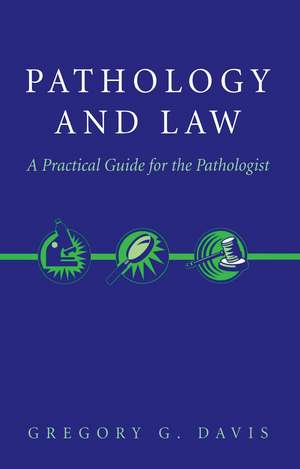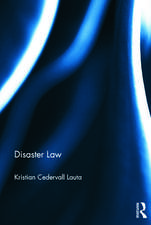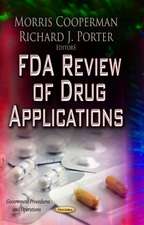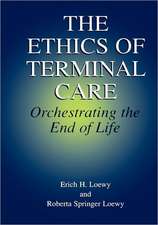Pathology and Law: A Practical Guide for the Pathologist
Autor Gregory Davisen Limba Engleză Paperback – 8 ian 2004
Written in an easy to read, conversational tone, with a dose of good humor, this book fills the need for a handbook that discusses the full spectrum of legal issues that many pathologists face, written from a pathologist's point of view. Organized in 12 user-friendly chapters, the book begins with a comparison of Law and Medicine and explains the basics of the American Legal System. It continues with discussions of the impact of law on the practice of pathology, including such topics as specimens with potential legal implications, the controversy of saving organs for teaching, procuring and saving specimens for toxicology testing and DNA confirmation in identity testing. A must-have section on malpractice suits covers reasons why patients sue, what to do if sued, and reducing the chance of being sued. The author addresses expert witness testimony, including how to be an expert witness, conflicts of interest, conduct in a courtroom, what to say and what not to say. Quality control and assurance as it applies to the pathologist is also discussed. Legal implications for the information age, including the use of internet and e-mail with regard to patient confidentiality is discussed in detail. Case samples are scattered throughout the text to illustrate the principles discussed. Every term is defined in the glossary.
Preț: 631.87 lei
Preț vechi: 743.38 lei
-15% Nou
Puncte Express: 948
Preț estimativ în valută:
120.95€ • 131.42$ • 101.66£
120.95€ • 131.42$ • 101.66£
Carte tipărită la comandă
Livrare economică 19 aprilie-03 mai
Preluare comenzi: 021 569.72.76
Specificații
ISBN-13: 9780387200354
ISBN-10: 0387200355
Pagini: 221
Ilustrații: XVI, 221 p. 1 illus.
Dimensiuni: 155 x 235 x 11 mm
Greutate: 0.34 kg
Ediția:2004
Editura: Springer
Colecția Springer
Locul publicării:New York, NY, United States
ISBN-10: 0387200355
Pagini: 221
Ilustrații: XVI, 221 p. 1 illus.
Dimensiuni: 155 x 235 x 11 mm
Greutate: 0.34 kg
Ediția:2004
Editura: Springer
Colecția Springer
Locul publicării:New York, NY, United States
Public țintă
Professional/practitionerDescriere
Almost all pathologists face legal issues when dealing with the specimens they work with on a day-to-day basis, whether it involves quality control and assurance in handling the specimens, facing the possibility of malpractice suits, or serving as an expert witness in a trial.
Written in an easy to read, conversational tone, with a dose of good humor, this book fills the need for a handbook that discusses the full spectrum of legal issues that many pathologists face, written from a pathologist's point of view. Organized in 12 user-friendly chapters, the book begins with a comparison of Law and Medicine and explains the basics of the American Legal System. It continues with discussions of the impact of law on the practice of pathology, including such topics as specimens with potential legal implications, the controversy of saving organs for teaching, procuring and saving specimens for toxicology testing and DNA confirmation in identity testing. A must-have section on malpractice suits covers reasons why patients sue, what to do if sued, and reducing the chance of being sued. The author addresses expert witness testimony, including how to be an expert witness, conflicts of interest, conduct in a courtroom, what to say and what not to say. Quality control and assurance as it applies to the pathologist is also discussed. Legal implications for the information age, including the use of internet and e-mail with regard to patient confidentiality is discussed in detail. Case samples are scattered throughout the text to illustrate the principles discussed. Every term is defined in the glossary.
Written in an easy to read, conversational tone, with a dose of good humor, this book fills the need for a handbook that discusses the full spectrum of legal issues that many pathologists face, written from a pathologist's point of view. Organized in 12 user-friendly chapters, the book begins with a comparison of Law and Medicine and explains the basics of the American Legal System. It continues with discussions of the impact of law on the practice of pathology, including such topics as specimens with potential legal implications, the controversy of saving organs for teaching, procuring and saving specimens for toxicology testing and DNA confirmation in identity testing. A must-have section on malpractice suits covers reasons why patients sue, what to do if sued, and reducing the chance of being sued. The author addresses expert witness testimony, including how to be an expert witness, conflicts of interest, conduct in a courtroom, what to say and what not to say. Quality control and assurance as it applies to the pathologist is also discussed. Legal implications for the information age, including the use of internet and e-mail with regard to patient confidentiality is discussed in detail. Case samples are scattered throughout the text to illustrate the principles discussed. Every term is defined in the glossary.
Cuprins
ContentsAcknowledgments PrefaceContributors 1. IntroductionOn Medicine and Law SimilaritiesDifferencesThe King in His Court 2. Theory and Operation of the American Legal SystemAmerican Legal Theory American Legal Theory in OperationThe Dramatis Personae Types of Trials—Civil and CriminalReferences 3. Impact of Law on Pathology Practice—Everyday OccurrencesMedical Practice The Duty of a PhysicianPathologist–Patient Relationship Abandonment Surgical Specimens with Forensic WorthGross Pathology and the Traumatic Spleen Bullets Chain of CustodySpecimens with Civil Implications(Especially Potential Malpractice)CytologyCervical Preparations Fine Needle Aspirates Autopsies Obtaining Autopsy ConsentPerforming a Hospital Autopsy Retention of SpecimensRoutineAt Request of an Attorney Anatomical Gifts and Unusual SpecimensClinical Pathology Samples for Toxicology Testing (Ethanol and Drugs of Abuse) Transfusion MedicineRequests for DNA Confirmation Citation of References in Reports Transmitting Information to Clinicians and Clinical Staff Reporting Critical ValuesWhat to Do When You Discover that an Error Has Occurred Statute of Limitations Pathology Leadership of The LaboratoryDisciplinary ActionsDismissal Confronting a Colleague Consultations and Liability Informal (Curbside) Consults By Clinical Staff of You Concerning an Opinion of Your Partner By a Partner on a Difficult Case Obtained by You from an Outside Expert in a Difficult CaseObtained of You by an Outside Pathologist in a Difficult CaseReferences 4. Impact of Law on Practice of Pathology—MalpracticeWhat Is Malpractice?The Four Pillars of Malpractice The Business of Malpractice LawPatients as Plaintiffs Practice of Medical Malpractice LawFormalNotification of a Malpractice SuitReaction to a Notice Response to a NoticeThe Importance of Keeping Your Mouth Shut Parties to Whom You Should Speak after Being Named as a Defendant, and Why Work with the Attorney Assigned to Represent You Signs that You Need a New Attorney Possible Outcomes When the Physician Is Found Guilty of MalpracticeWhen the Physician Is Found Not Guilty of MalpracticeDifficulty of CountersuitsReducing the Chance of a Malpractice Suit Indefensible Positions The Impaired PhysicianProfessional Misconduct Criminal Wrongdoing References 5. Expert Witness Testimony Requirements to Be an Expert Witness Reasons to Avoid Becoming an Expert WitnessHow to Become an Expert Witness Accepting or Refusing a CaseExpectations of a Good Expert Witness EquanimityKeeping Track of Prior TestimonyReportCompetence in Testifying Payment as an Expert Witness What an Expert Witness Is Paid forSetting Expert Witness Fees Getting Stiffed References 6. Natural History of a Legal Suit Preliminary StagesReviewing the Case with an Attorney Reviewing the Case YourselfDepositionWhat Is a Deposition? Advantages of a Deposition Conduct at DepositionOutcome of a Deposition TrialJury Selection Presentation of EvidenceJury Deliberation Mistrials Trial Dates Testifying On Giving a Good Performance On TestifyingLegal Ploys Used by Attorneys 7. Unethical Expert Witness Testimony Ethical Expert Witness TestimonyUnethical Expert Witness Testimony LyingWillful Failure to Consider Pertinent Medical EvidenceQuackeryMechanisms for Handling Unethical TestimonyIn CourtOut of CourtConclusion References 8. Quality Assurance and Record KeepingDefinitions and RequirementsImportance of Quality Assurance to a Hospital Over
Caracteristici
Includes supplementary material: sn.pub/extras

















